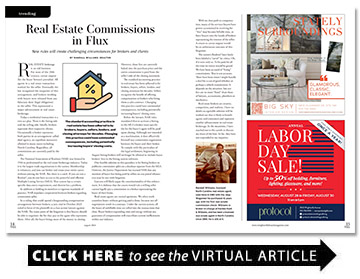Real Estate Commissions in Flux
New rules will create challenging circumstances for brokers and clients
BY Randall Williams, Realtor

Real estate brokerage is an old business. For most of the 20th century, caveat emptor (let the buyer beware) prevailed. All agents in a real estate transaction worked for the seller. Eventually the law recognized the inequities of this arrangement, and brokers working with buyers were released from any fiduciary duty (legal obligation) to the seller. This represented a major advancement in real estate brokerage.
Today a residential transaction is a two-act play. There is the listing side and the selling side. Ideally, brokers represent their respective clients. Occasionally a broker represents both parties in an arrangement called dual agency, an expedient maneuver allowed in many states including North Carolina. Regardless, all commissions are currently paid by the seller.
The National Association of Realtors (NAR) was formed in 1916 to professionalize the real estate brokerage industry. Today it is the largest trade organization in the nation. Membership is voluntary, and you can broker real estate your entire career without joining the NAR. But there is a catch. If you are not a Realtor®, you do not have access to the powerful and efficient Multiple Listing Service (MLS). That system has a certain specific data entry requirement, and therein lies a problem.
In addition to holding its members to rigorous standards of practice, NAR stipulates cooperation between brokers regarding commission splits.

In a ruling that could upend a longstanding compensation arrangement between brokers, a jury trial in October 2023 ruled in favor of the plaintiffs in a class action lawsuit against the NAR. The main point of the litigation is that buyers should be able to negotiate the fee they pay to the agent who represents them. After all, the buyer brings most of the money to closing. However, those fees are currently baked into the purchase price and the entire commission is paid from the seller’s side of the closing statement.
The standard accounting practice in real estate has been adhered to by brokers, buyers, sellers, lenders, and closing attorneys for decades. Sellers recognize the benefit of offering compensation to brokers who bring them a sales contract. Changing this practice could have unintended consequences, including potentially increasing buyers’ closing costs.
Before the lawsuit, NAR rules mandated that to activate a listing in the MLS a broker must specify the fee the buyer’s agent will be paid upon closing. Although not intended as a machination, it does effectively forestall any commission negotiation between the buyer and their broker. To comply with the particulars of the legal settlement, beginning in August listing brokers will no longer be allowed to include buyer brokers’ fees in the listing system software.
One feasible solution to this quandary is for listing brokers to publicize commission splits on a database separate from the MLS. However, the Justice Department has warned NAR that any mention of buyer fees being paid by sellers on any portal whatsoever may be met with litigation.
Lawyers will likely argue the constitutionality of this enforcement. It is dubious that the courts would rule a willing seller cannot legally pay a commission to a broker representing the buyer of their home.
The standard accounting practice in real estate has been adhered to by brokers, buyers, sellers, lenders, and closing attorneys for decades. Changing this practice could have unintended consequences, including potentially increasing buyers’ closing costs.
Real estate agents are eternal optimists. We often work countless hours without getting paid a dime, because not all negotiations result in a contract. Under the current system, all the hours of unbillable time are rolled into the transactions that close. Buyer brokers expending time and energy without any guarantee of compensation will exacerbate current inefficiencies within our industry.
With no clear path to compensation, many of the services buyers have grown accustomed to receiving for “free” may become billable time, or force buyers into the hands of brokers representing the interest of the seller. A return to caveat emptor would be an unfortunate outcome of this litigation.
The nation’s Realtors® have lately been labeled a “cartel” by critics. Oh, if it were only so. To be paid for all the time we invest would be grand. We have been accused of “fixing” commissions. That is not accurate. There have been times I might handle a deal for a case of good whiskey or perhaps a rebuilt transmission. It depends on the situation, but our fees are no more “fixed” than those of lawyers, accountants, plumbers or mechanics.
Real estate brokers are creative, competitive, and resilient. I have no doubt an equitable solution will be worked out that is likely to benefit agents and consumers and represent another advancement in real estate brokerage. In the meantime, I have reached out to the cartels to discuss my share of the loot. So far, they have not responded to my inquiries.

